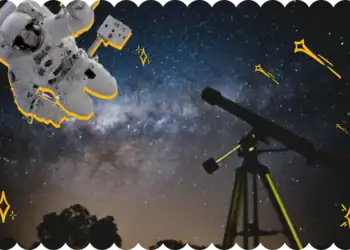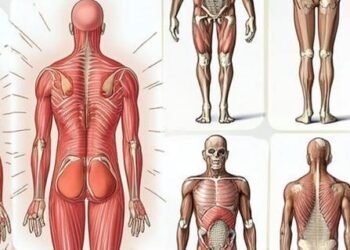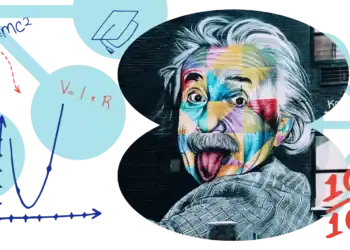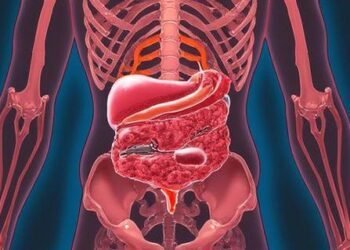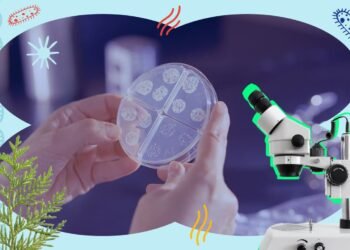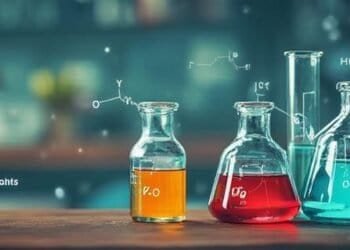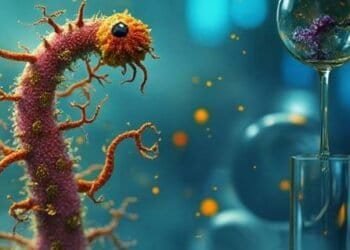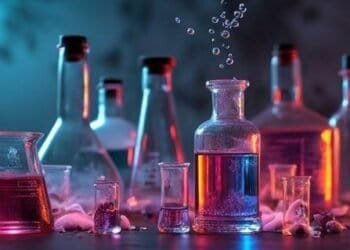If quarks and quantum physics make your heart race, get ready to experience an acute case of tachycardia. It’s time to light your Bunsen burner and dust off your favorite Erlenmeyer flask as you push your brain to the limits with a science quiz that scored a 10 on the Mohs Hardness Scale.
Despite what 80s movies would have us believe, being passionate about science is nothing to be ashamed of. Sure, jocks might get those cool letterman jackets, but you know way more about dinosaurs, space, and stoichiometry. That gives you a clear advantage should the world suddenly need an amateur paleoastrochemist to neutralize a radioactive meteor occupied by rabid velociraptors.
Once you’ve conquered this list of science trivia questions and answers, why not take a quick refresher course on space trivia, physics questions, or geology trivia? With enough practice, even Bill Nye the Science Guy would be proud to have you as a lab partner.
A bone called the cranium protects which organ of the body?
Heart
Liver
Lung
Brain
The element Gallium is named after the Latin name for which country?
France
Italy
Switzerland
Spain
The study of human populations has which scientific name?
Immunology
Archaeology
Anthropology
Demography
Rubella is also known as which sort of measles?
French
German
Swiss
Dutch
Which of these scales measures the strength of earthquakes?
Beaufort
Richter
Reaumar
Celsius
Chloroplasts are found within the cells of which living creatures?
Insects
Mammals
Plants
Birds
Dolly, the first creature to be cloned, was which animal?
Dog
Cat
Sheep
Rabbit
Which gas is used in MRI scanners to cool the magnets?
Argon
Nitrogen
Methane
Helium
Which crop is grown in a flooded field called a paddy?
Rice
Oat
Wheat
Rye
Who once claimed to be able to reanimate corpses?
Ernest Rutherford
Maurice Wilkins
Carl Anderson
Giovanni Aldini
On which flat mathematical shape might you be asked to calculate the hypotenuse?
Hexagon
Circle
Square
Triangle
Lunar refers to which celestial body?
Mars
Moon
Sun
Earth
In which decade was the first Space Shuttle launch?
1990s
1970s
1980s
1950s
Aerobic respiration requires what?
Methane
Carbon dioxide
Oxygen
Propane
Which gas produces water when it burns?
Hydrogen
Helium
Neon
Nitrogen
What is another name for either of the two legs in a right triangle?
Cathetus
Parallellogram
Cartesian
Hypotenuse
What are conchologists interested in?
Plants
Shells
Technology
Animals
What does a conchologist collect?
Eggs
Shells
Butterflies
Leaves
Which biology term describes the environment where a plant or animal lives?
Field
Locus
Species
Habitat
Rods and cones, also known as photoreceptors, are found in which part of the body?
Nose
Ear
Heart
Eye
Marie Curie won Nobel Prizes in Physics and which other field?
Literature
Chemistry
Medicine
Economics
Pb is the chemical symbol for which metal?
Silver
Copper
Lead
Gold
The force exerted on a specific surface area has which name?
Pressure
Voltage
Density
Temperature
What does an invertebrate not have?
Eyes
Backbone
Tail
Teeth
The project to develop the atomic bomb was named after which part of New York?
Harlem
Manhattan
Bronx
Queens
What is the only sea mammal that does not have an insulating layer of fatty blubber?
The walrus
The manatee
The sea otter
The dolphin
To whom was Marie Curie married?
Pierre Curie
Leonardo Curie
James Curie
Alexander Curie
What is used to generate hydropower?
Wind
Coal
Water
Gas
What was the surname of pioneering scientists Marie and Pierre?
Darwin
Hawking
Rutherford
Curie
Which chemical is often used to kill bacteria in water, such as swimming pools?
Neon
Chlorine
Cobalt
Bismuth
Which word is used by scientists to describe speed through water?
Knot
Knit
Knap
Knup
In genetics, what is the opposite of a dominant trait?
Recessive
Recombined
Rejected
Rejective
Where are the smallest bones in the human body found?
Hand
Neck
Foot
Ear
Which word describes a tree which sheds its leaves each year?
Evergreen
Deciduous
Perennial
Robust
Hepatitis is a medical condition affecting which organ of the body?
Kidney
Liver
Heart
Skin
Which science term is the opposite of digital?
Physical
Semiconductor
Manual
Analogue
The masseter muscle is found in which part of the body?
Jaw
Ankle
Hip
Elbow
Lyme Disease can be picked up from the bite of which insect?
Spider
Eel
Ant
Tick
What is the name for the scientific study of the weather?
Anthropology
Archaeology
Botany
Meterology
Which chemical element takes its name from the Greek word for color?
Carbon
Fluorine
Chromium
Neon
What is karyology the study or science of?
Fungi
The sea
Cell nuclei
Food
Which of these garden creatures has a shell?
Slug
Caterpillar
Worm
Snail
Capillary action refers to the movement of which form of matter?
Liquid
Metal
Gas
Solid
To which group of sharks do Wobbegongs belong?
Hammerhead Sharks
Cookie-Cutter Sharks
Nurse Sharks
Carpet Sharks
Which part of the eye moves to allow us to focus on images?
Retina
Iris
Lens
Cornea
Which British scientist developed the idea of natural selection and evolution?
Darwin
Newton
Watt
Einstein
A metal made from two or more elements has which name?
Cobalt
Alloy
Imperial
Precious
Selenologists study which object in the solar system?
Moon
Comet
Mars
Sun
What is nosology the study of?
Society
Equipment design for the workplace
Diseases
Ground water
What is the medical term for hair loss?
Antipraxy
Anticoagulant
Alliteration
Alopecia
Magnets can attract like, or do what to opposites?
Repel
Reduce
Repose
Reject
What is infant whale commonly called?
Sow
Calf
Cat
Cub
What is the average lifespan of a Chinchilla?
10 years
3 years
22 years
18 years
Which of these conditions is caused by plants’ reproductive cycles?
German measles
Rickets
Chicken pox
Hay fever
A chemist from which country invented the Bunsen Burner?
Germany
Canada
China
Russia
What was the surname of the second man to walk on the moon?
Aldridge
Albarn
Aldrin
Alwright
What is the lifespan of a shrimp?
20 years
6 months
2 months
1-2 years
Insulin is produced in which organ of the body?
Kidneys
Pancreas
Spleen
Liver
The adjective dermal refers to which part of the body?
Liver
Neck
Skin
Lung
What is the world’s largest tree-born fruit?
The jackfruit
The Coco de Mer
The watermelon
The pineapple
Which term describes a sudden explosion on the surface of the sun?
Sun Split
Lunar Flood
Heliophere
Solar Flare
A haematologist is an expert in which field of medicine?
Blood
Skin
Pregnancy
Bones
In physics, which force involves rubbing one object against another?
Kinetic
Electric
Pressure
Friction
Which dietary mineral is essential for strong bones?
Calcium
Carbon
Zinc
Magnesium
What comes after ‘Kuiper’ in a solar system zone beyond the orbit of Neptune?
Field
Belt
Area
Zone
Which British scientist wrote A Brief History of Time?
Brian Cox
Charles Darwin
Stephen Hawking
Edward Jenner
Whose law states that: ‘At a constant temperature, the pressure of a gas is inversely proportional to its volume’?
Boyle’s Law
Newton’s Law
Watson’s Law
Dawson’s Law
What is the name of the brightest star as seen from Earth?
Hermione
Phobos
Sirius
Bellatrix
In anatomy, where would you find your pharynx?
Throat
Brain
Arm
Chest
Which chemical element has the symbol Sr?
Silver
Strontium
Tin
Silicon
Which word describes the deterioration of a metal or element in the environment?
Covalent
Corruption
Corrosion
Convergence
Where in the body is the trachea located?
The head
The foot
The neck
The stomach
Which planet of the solar system is closest to the sun?
Earth
Venus
Jupiter
Mercury
What is the name for the blood vessel which carries blood away from the heart?
Tubercule
Artery
Alveoli
Vein
Stephen Hawking was a pioneer in which field of science?
Microbiology
Theoretical Physics
Anthropology
Immunology
Which is the lightest metal in chemistry’s periodic table?
Lithium
Silver
Tungsten
Lead
Marie Curie named an element after which country, the land where she was born?
Germany
Russia
Poland
India
Joseph Priestley discovered which gas in 1774?
Neon
Oxygen
Helium
Nitrogen
The verb pollinate is used to describe the fertilisation of which living objects?
Fish
Insects
Birds
Plants
What color is copper sulphate?
Blue
Greed
Yellow
Red
Which tree family includes the sycamore and maple?
Conifer
Acer
Acacia
Elder
What term do astronomers use for a group of stars?
Interception
Eclispe
Constellation
Aurora
Which power is generated using the fission process?
Solar
Wave
Nuclear
Electric
Hydrogen combines with which other element to form water?
Oxygen
Nitrogen
Carbon
Lead
Which sugary liquid do insects get from plants and flowers?
Glucose
Saffron
Nectar
Ambrosia
What is the name of the skill of cutting hedges into ornamental shapes?
Pottery
Topiary
Calligraphy
Origami
Copper turns which color when it oxidises in the open air?
Green
Blue
Red
White
Which gas is essential to allow us to breathe?
Oxygen
Neon
Helium
Nitrogen
Which metal, used for currency or jewellery, has the chemical symbol Ag?
Platinum
Copper
Silver
Gold
Which scientists study rocks and the Earth’s composition?
Ornithologists
Anthropologists
Geologists
Archaeologists
HIV grew to mass notoriety during which decade?
1860s
1980s
1920s
1750s
Which pigment gives our skin its color?
Keraton
Collagen
Silicone
Melanin
What is apiology the study of?
The structure of the body
Blood
The stomach and intestines
Bees
Alloy is used to describe a mixture of metals to form what?
Gas
Metal
Rubber
Liquid
Plutonium is derived from which other element?
Helium
Uranium
Chromium
Einsteinium
Which four letter word is a unit of electrical power?
Watt
Ward
Wave
Walk
Our teeth are covered by which hard, shiny material?
Dentine
Enamel
Collagen
Fluorine
Which word describes a plant made by crossing two other species of plant?
Hyperpollen
Fragmented
Spliced
Hybrid
What nationality was the first non-US, non-Soviet spaceman?
French
Canadian
Czechoslovakian
English
Which term do doctors often use instead of stitches?
Bandages
Terroids
Sutures
Zygotes
Which metal is most commonly used to make a soft drinks can?
Zinc
Tin
Magnesium
Aluminium
You can do better
Not bad
Great!
Check out our shorter, more focused quizzes based on this one:










